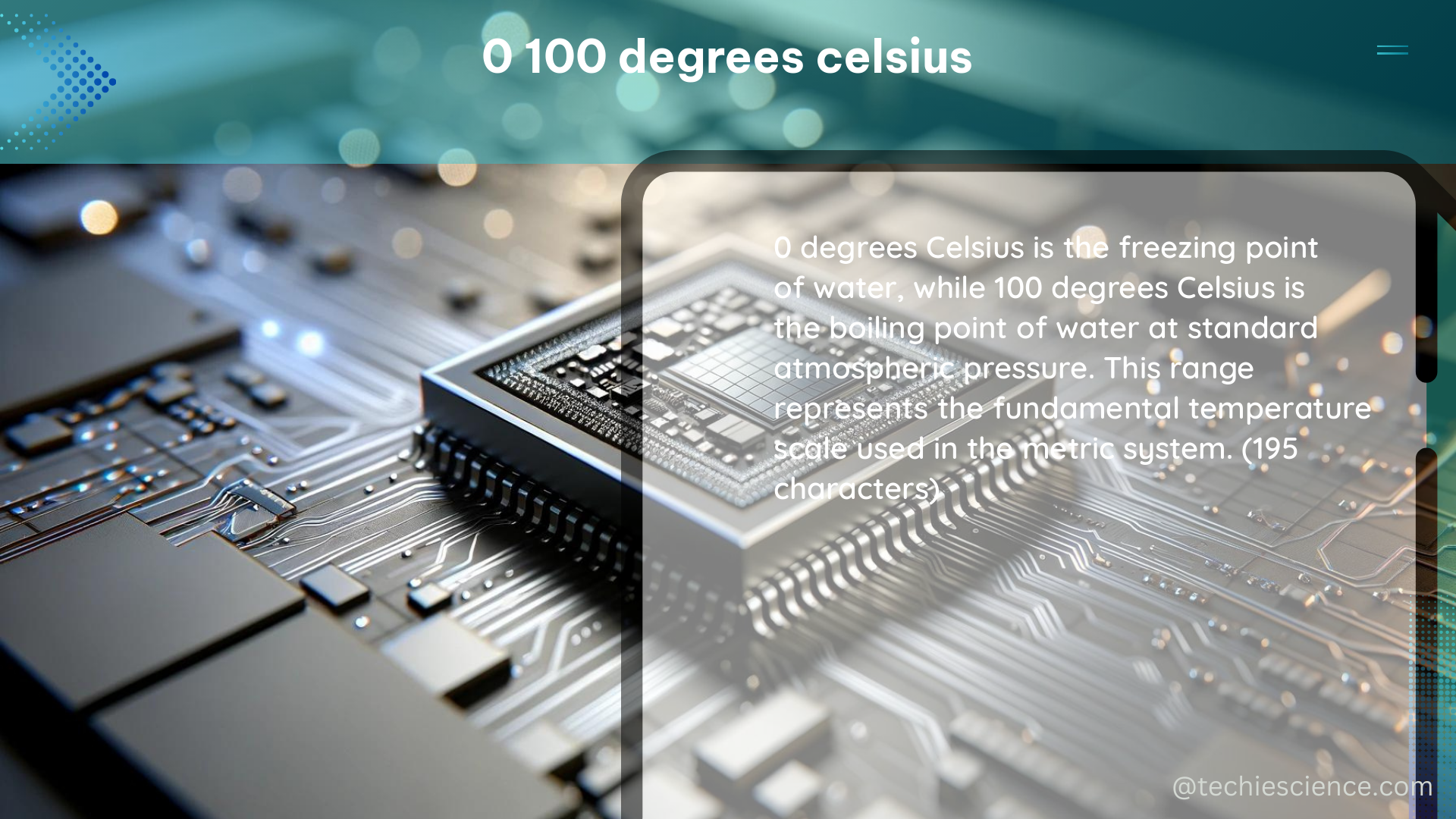The temperature range of 0 to 100 degrees Celsius is a fundamental and widely used scale in science, engineering, and everyday life. This range encompasses the critical phase changes of water, making it essential for understanding thermodynamics, heat transfer, and environmental processes.
Understanding the 0 to 100 Degrees Celsius Scale
The 0 to 100 degrees Celsius scale is an absolute temperature scale, meaning it is based on the fundamental properties of matter and energy rather than arbitrary human-defined references. Specifically:
- 0 degrees Celsius (0°C) represents the freezing point of water at standard atmospheric pressure.
- 100 degrees Celsius (100°C) represents the boiling point of water at standard atmospheric pressure.
This scale is widely used in the International System of Units (SI) and is the primary temperature scale in most countries around the world.
Quantifiable Data Points within the 0 to 100 Degrees Celsius Range

The 0 to 100 degrees Celsius scale is associated with numerous quantifiable data points that are crucial in various scientific and engineering applications:
Specific Heat Capacity of Water
- The specific heat capacity of water is approximately 4.18 kilojoules per kilogram per degree Celsius (kJ/kg°C).
- This value is critical in understanding the thermal behavior of water and designing heating and cooling systems.
Latent Heat of Vaporization and Fusion of Water
- The latent heat of vaporization of water is about 2256 kilojoules per kilogram (kJ/kg).
- The latent heat of fusion of water is approximately 334 kilojoules per kilogram (kJ/kg).
- These values are essential in understanding phase changes, energy conversion processes, and climate-related phenomena.
Efficiency of Heat Engines
- The efficiency of heat engines, such as internal combustion engines and steam turbines, is directly related to the temperature difference between the hot and cold reservoirs.
- The 0 to 100 degrees Celsius range is a common reference for calculating the theoretical maximum efficiency of these engines.
Meteorological and Climatological Applications
- The 0 to 100 degrees Celsius scale is widely used in meteorology and climatology to describe temperature variations and trends.
- For example, the global average temperature has increased by approximately 1 degree Celsius over the past century, with significant implications for climate change and environmental policies.
Practical Applications of the 0 to 100 Degrees Celsius Range
The 0 to 100 degrees Celsius scale has numerous practical applications across various fields:
Heating and Cooling Systems
- The 0 to 100 degrees Celsius range is crucial in the design and operation of heating, ventilation, and air conditioning (HVAC) systems, as well as refrigeration and cryogenic systems.
Food and Beverage Processing
- The 0 to 100 degrees Celsius range is essential for food and beverage processing, including pasteurization, sterilization, and cooking/baking processes.
Chemical and Industrial Processes
- Many chemical and industrial processes, such as distillation, fermentation, and material processing, rely on the 0 to 100 degrees Celsius range for optimal performance and efficiency.
Environmental Monitoring and Research
- The 0 to 100 degrees Celsius scale is widely used in environmental monitoring and research, including the study of climate change, weather patterns, and ecosystem dynamics.
Conclusion
The 0 to 100 degrees Celsius temperature range is a fundamental and widely used scale in science, engineering, and everyday life. Its relevance spans various fields, from thermodynamics and heat transfer to meteorology and climatology, making it a critical concept to understand and utilize in both theoretical and practical contexts. By exploring the quantifiable data points and practical applications within this range, we can gain a deeper appreciation for the importance of this temperature scale in shaping our understanding of the physical world.
References:
- Eliezer Yudkowsky, Torture vs. Dust Specks – LessWrong, 2007-10-29, https://www.lesswrong.com/posts/3wYTFWY3LKQCnAptN/torture-vs-dust-specks
- Carlo Magno, Designing Written Assessment for Student Learning, 2013, https://www.researchgate.net/profile/Carlo-Magno/publication/277405724_Designing_Written_Assessment_for_Student_Learning/links/556a8f5208aefcb861d5f61c/Designing-Written-Assessment-for-Student-Learning.pdf
- College Board, AP® Biology Quantitative Skills: A Guide for Teachers, 2015, https://secure-media.collegeboard.org/digitalServices/pdf/ap/AP_Bio_Quantitative_Skills_Guide-2ndPrinting_lkd.pdf
- Center for American Progress, A 100 Percent Clean Future, 2019-10-10, https://www.americanprogress.org/article/100-percent-clean-future/
- Dr. Roy Spencer, Why Blaming Recent Warming on Humans is Largely a Matter of Faith, 2022-03-03, https://www.drroyspencer.com/2022/03/why-recent-warming-blamed-on-humans-is-largely-a-matter-of-faith/

The lambdageeks.com Core SME Team is a group of experienced subject matter experts from diverse scientific and technical fields including Physics, Chemistry, Technology,Electronics & Electrical Engineering, Automotive, Mechanical Engineering. Our team collaborates to create high-quality, well-researched articles on a wide range of science and technology topics for the lambdageeks.com website.
All Our Senior SME are having more than 7 Years of experience in the respective fields . They are either Working Industry Professionals or assocaited With different Universities. Refer Our Authors Page to get to know About our Core SMEs.